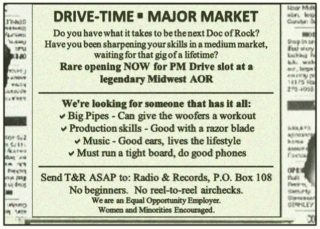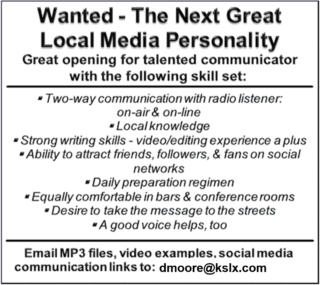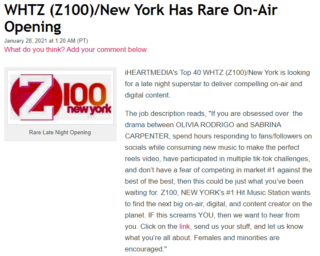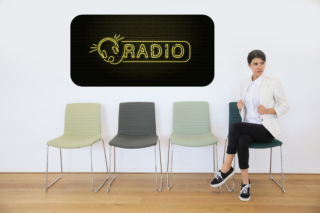
With some degree of anxiety, we’re all anticipating a return to our old lives, even though we may not know what that might look like. And one hopes the vaccines will become widely administered and that they’ll be effective against the COVID variants, many of us are looking forward to that time later this year when we’ll see that “swing back” or rebound.
We just don’t exactly what it will look like or feel like. Or when it will happen.
It’s the same thing with the radio business, and many other industries – including travel, concerts, sports, and dining. That is, our leisurely pursuits. And as part of the entertainment landscape, broadcast radio operators are tasked with calculating what our world will be like, and how to meet the moment. We are all trying to visualize our futures.
But as millions of us will head to our cars, to beaches, to sports arenas, and to concert halls, it’s hard not to imagine that advertising and marketing will, in fact, rebound. After all, businesses will have to get the word out. And street teams will have to be rehired, retained, and deployed in local markets everywhere.
And how might all of that impact hiring post-COVID? Will radio broadcasters be looking for different kinds of employees and most importantly, different skill sets for this next critical phase of the medium’s cycle?
You’d hope so.
And that’s why the ad at the top of this blog post should have a nostalgic ring of familiarity for old timers in radio. For those who don’t recognize some of the terms, just trust me what it took to get a radio job in the 80s has been redefined by new and changing industry needs.
The ad is something I mocked up for a presentation I’ve been doing for more than 20 years “Building Better DJs” – for air talent and programming teams to make the point the needs of the radio business are changing.
And sadly, too many PDs and way too many prospective hosts, talent, DJs – whatever we want to call them – may not be as prepared for “What’s next?” as they might think. The ad was meant to typify the standard “help wanted” post you’d see in multitudes in Radio & Records and other industry publications. They tended to be similar – focusing on on-air performance, and in many cases, having that FCC third class license – with that all-important endorsement.
That’s not to say it was easy to get a radio job in 1979. It wasn’t. The competition was stiff, and even though most stations had live talent on the air 24/7 and “shifts” were four hours long, the frenzy to get a radio job – especially that first one – was intense.
 But in so many of my conversations with talent and other content creators who have found themselves “on the beach” or “between opportunities,” the road back can be a rough one.
But in so many of my conversations with talent and other content creators who have found themselves “on the beach” or “between opportunities,” the road back can be a rough one.
On the one hand, reinvention is difficult no matter the age. And acquiring new skills can be an arduous task. Clearly, the digital tsunami has been that true game-changer, forcing talent from all radio departments to reassess their capabilities and repertoires.
But perhaps the biggest challenge facing talent and programmers trying to get “back in” revolves around shifting local management and corporate priorities. And sometimes, you get the feeling the people in the corner offices are grappling with the optimal traits and attributes they’re looking for in this next generation of staffers.
So, as part of the “DJs” presentation, I urge programmers and managers to give serious thinking when one of those staff openings materializes. There are fewer of them, and so hiring and evaluating become even more critical to the process.
And that requires prioritizing what is truly important for that next hire – especially on the talent side. Here was my example:

This “new” ad was written years ago now, but you can see where I was headed. There’s very little resemblance between it, and that original R&R mockup. And that’s the point.
Times change. Priorities shift.
As a programmer hiring my share of air talent, I never once asked about the ability to make a great sales experience or writing skills, among other things. And in looking over this “new” ad, it has already become dated – social “networks” and the term “on-line” are easy tipoffs.
So, what would a 2021 ad for air talent look like? What skills are most desirable now, as we prepare for radio life after the pandemic.
Part of the answer may be evident in a recent ad Z100 ran that captured the attention of the AllAccess team. That’s because it doesn’t look or read like “help wanted” radio ads of even the past few years:

The ad screams engagement, interaction, and pop culture savvy. Conversely, there’s not a word about “pipes.” The word “radio” doesn’t appear in the ad, nor does “broadcasting.”
The guy who sent the ad to me is Jeff Rowe, former radio programmer (nee Dallas Cole) who made the leap to television in the 80s at Vh1 and later with NBC-TV – and never looked back. Jeff’s most recent project is producing the new documentary, “Rock Camp,” featuring music impresario David Fishof. These days, Jeff has a foot back in radio, providing NPR (among others) with consulting focused on programming, performance, and presentation.
later with NBC-TV – and never looked back. Jeff’s most recent project is producing the new documentary, “Rock Camp,” featuring music impresario David Fishof. These days, Jeff has a foot back in radio, providing NPR (among others) with consulting focused on programming, performance, and presentation.
Jeff’s combined skills in television and radio at some of the highest levels provide him with a unique perspective. And when he sent me that Z100 ad, he included this observation:
“When I saw this Z100 post on AllAccess regarding what they were looking for in a new host I thought, this is the most unique and different job description for a radio host that I’ve seen in years.”
And he followed with this observation that I’ve been thinking about these past few days, especially in my regular conversations with station management teams trying to navigate very challenging waters:
“We need to ask, what are the attributes of the modern…radio host?”
And that’s true for the entire spectrum of talent – in the myriad commercial radio formats, as well as public radio (where Jeff is obsessing this question), Christian radio, and everything in between.
 As radio broadcasters vie for consumer attention in an expanding ecosystem of streaming, satellite-delivered programming, podcasts, and syndicated shows, what is the role of local talent? That question becomes even more poignant when you consider how many radio stations in the coming years will only have one or two on-site content people. Defining their job duties and their performance measures will be of paramount importance.
As radio broadcasters vie for consumer attention in an expanding ecosystem of streaming, satellite-delivered programming, podcasts, and syndicated shows, what is the role of local talent? That question becomes even more poignant when you consider how many radio stations in the coming years will only have one or two on-site content people. Defining their job duties and their performance measures will be of paramount importance.
Many radio companies are still hiring and rewarding talent with anachronistic practices, making the old R&R ad not as dated as it should be. Stations still dangle ratings bonuses, even though measurement and other evaluative metrics are outmoded and less relevant today than ever.
If the radio industry is going to narrow its focus, hire fewer people, and raise the bar on future hires, that’s reality in 2021. But it becomes even more mission critical that hiring criteria and desirable skills are clear and well-defined.
In many of my conversations with displaced talent, I continue to hear the question, “What are they looking for?” Or does my resume match up with current hiring priorities?
There was something very comforting about those old ads in R&R. You knew what “they” wanted.
Tapes and resumes only.
No calls.
Read more: jacobsmedia.com
